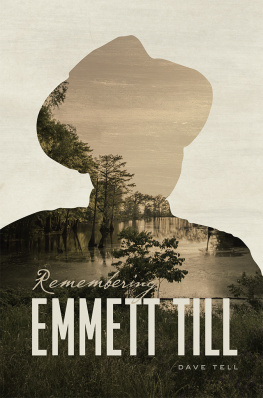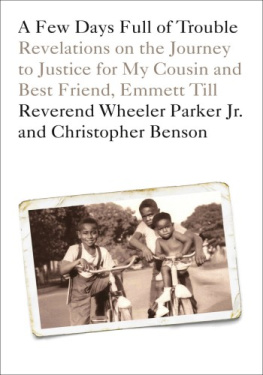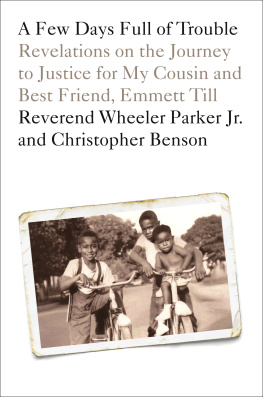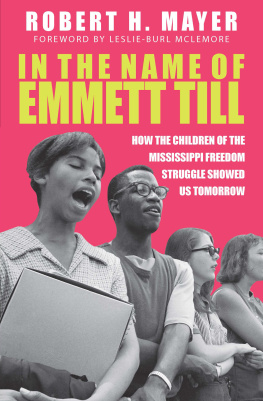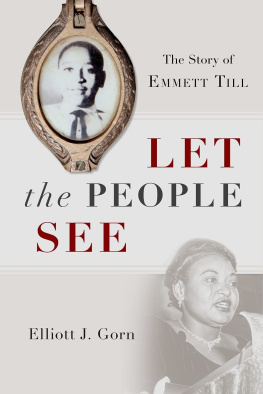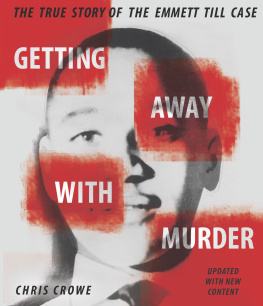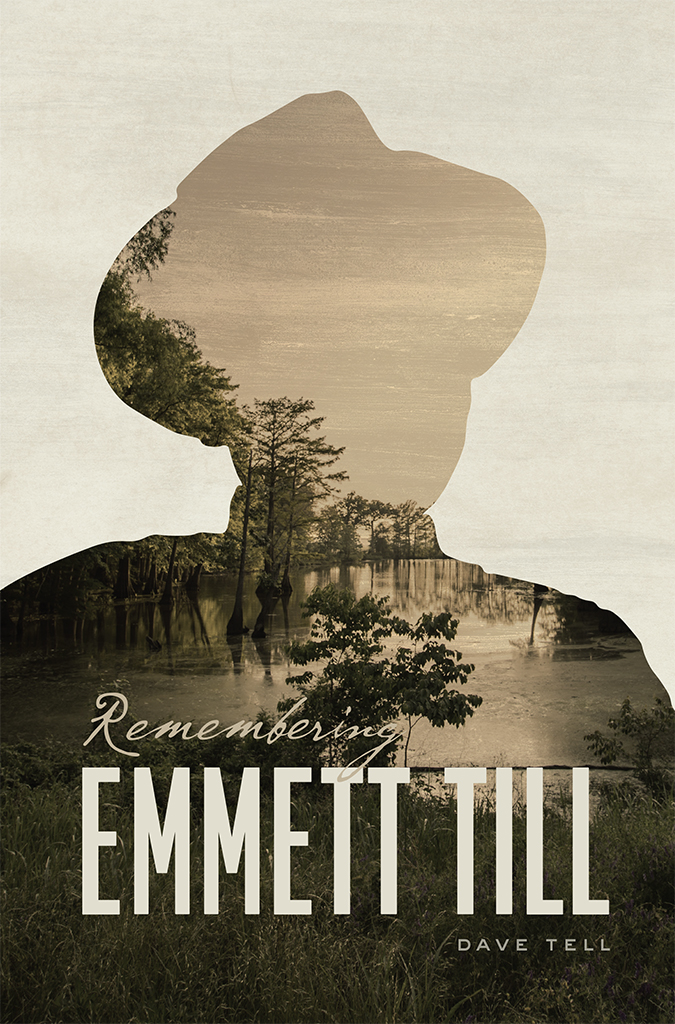
REMEMBERING EMMETT TILL
Remembering
EMMETT TILL
Dave Tell
The University of Chicago Press
Chicago and London
The University of Chicago Press, Chicago 60637
The University of Chicago Press, Ltd., London
2019 by The University of Chicago
All rights reserved. No part of this book may be used or reproduced in any manner whatsoever without written permission, except in the case of brief quotations in critical articles and reviews. For more information, contact the University of Chicago Press, 1427 E. 60th St., Chicago, IL 60637.
Published 2019
Printed in the United States of America
28 27 26 25 24 23 22 21 20 19 1 2 3 4 5
ISBN-13: 978-0-226-55953-7 (cloth)
ISBN-13: 978-0-226-55970-4 (e-book)
DOI: https://doi.org/10.7208/chicago/9780226559704.001.0001
Library of Congress Cataloging-in-Publication Data
Names: Tell, Dave, 1976 author.
Title: Remembering Emmett Till / Dave Tell.
Description: Chicago ; London : The University of Chicago Press, 2019. | Includes bibliographical references and index.
Identifiers: LCCN 2018043686 | ISBN 9780226559537 (cloth : alk. paper) | ISBN 9780226559704 (ebook)
Subjects: LCSH: Till, Emmett, 19411955Anniversaries, etc. | Till, Emmett, 19411955Anniversaries, etc.Economic aspects. | Murder victimsMonumentsMississippiDelta (Region)History. | Murder victimsMonumentsMississippiTallahatchie CountyHistory. | Delta (Miss. : Region)Social conditions. | Tallahatchie County (Miss.)Social conditions. | Delta (Miss. : Region)Race relations. | Tallahatchie County (Miss.)Race relations. | Civil rights movementsUnited StatesHistory.
Classification: LCC E185.93.M6 T45 2019 F347.M6 | DDC 364.1/34dc23
LC record available at https://lccn.loc.gov/2018043686
This paper meets the requirements of ANSI / NISO Z39.481992 (Permanence of Paper).
For the Emmett Till Memorial Commission of Tallahatchie County, Inc.
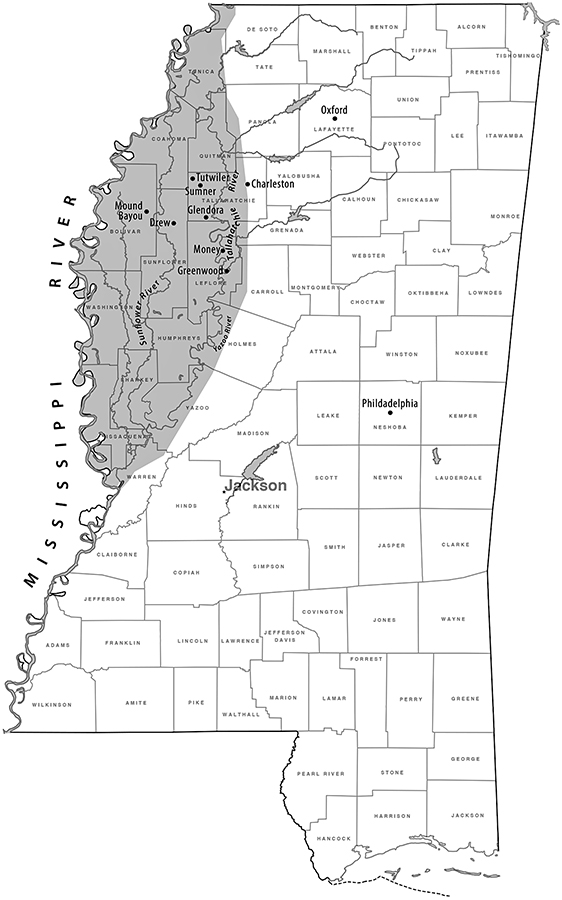
The shaded area is the Mississippi Delta. Map by Hammons and Associates. Used by permission.
I have a dream this afternoon that there will be a day that we will no longer face the atrocities that Emmett Till had to face or Medgar Evers had to face, that all men can live with dignity.
Martin Luther King Jr., Detroit, June 23, 1963
CONTENTS
If the quality of a book may be calibrated to the extent of its debts, Remembering Emmett Till will be incredible. Initial funding was provided in generous measure by the Hall Center for the Humanities at the University of Kansas, and a fellowship from the National Endowment for the Humanities provided the leisure to write. Between the Hall Center at the beginning of the project and the NEH down the homestretch, my research and writing have been supported by an incredible array of institutions, libraries, foundations, nonprofits, state agencies, commercial enterprises, and colleagues of all stripes.
At the Hall Center for the Humanities, I thank Sarah Bishop, Clarence Lang, Eliott Reeder, Bobbi Jo Rahder, and Victor Bailey. Without Sally Utechs commitment to the public humanities or Kathy Porschs ability to fund them, this book would not exist.
I fear Ive called upon every librarian at the University of Kansas. In particular, Pam Lach, Brian Rosenblum, Rhonda Houser, Sara Morris, Karna Younger, Carmen Orth-Alfie, Scott McEathron, Ada Emmett, Josh Bolick, LeAnn Meyer, Marianne Reed, and Jeromy Horkman have lent their expertise to this project. Im particularly indebted to Julie Petrs ability to answer my crazy questions (How high was the Tallahatchie River in 1955?).
At the University of Kansas, I thank Jay Childers, Tom Beisecker, Ben Chappell, Emily Ryan, Anne Dotter, Elizabeth MacGonagle, Beverly Mack, David Roediger, Shawn Alexander, Jonathan Lamb, Ed Healy, Laura Mielke, Frank Farmer, Carl Lejuez, Danny Anderson, Jim Mielke, Germaine Halegoua, Bill Tuttle, Andy Anderson, Ludwin Molina, John Fackler, Sheyda Jahanbani, Erik Scott, Marta Vicente, Maryemma Graham, Randal Jelks, Henry Fortunato, Dorthy Pennington, Cheryl Lester, Sherrie Tucker, Hannah Britton, Tamara Falicov, Joy Ward, Steven Epstein, Beth Innocenti, Jeremy Shellhorn, Nathan Wood, Robin Rowland, Rick Hellman, Christine Metz Howard, Kristi Henderson, and Mary Lee Hummert. Thanks to Lindsay Harroff for fantastic research assistance and to Jenea Havener for reading a draft and making the book more precise, less repetitive, and more compelling!
While my list of debts runs long in Kansas, it runs still longer in Mississippi. At the University of Mississippi, I thank Jennifer Ford, Leigh McWhite, Ted Ownby, Bill Rose, and Jody Skipper. At the William Winter Institute for Racial Reconciliation, I thank Susan Glisson, Charles Tucker, Jennifer Stollman, April Grayson, and Portia Espy. At the Mississippi Department of Archives and History, I thank Mingo Tingle, Bill Gatlin, Ken PPool, and, above all, Alieen de la Torre. At the Mississippi Development Authority, I thank Sarah McCullough, Joy Foy, Mary Margaret Miller, and director Craig Ray. At Belinda Stewart Architects, I thank Belinda Steward and Holly Hawkins. At Hammons and Associates, I appreciate the support of Wanda Clark and the steady guidance of president Allan Hammons. In addition to these, I benefited from a wide range of indispensable Mississippi contacts. Included are Rolando Herts, Tim Kalich, David Rae Morris, W. Ralph Eubanks, Richard Dickson, Reilly Morse, John R. Hailman, Patrick Magennis, John Elzey, Clay McFerrin, James W. Powers, George Schimmel, Temita Davis, Jim Abbott, Kate Hackett, Allan Barton, Susan Neiman, Kathryn Green, Mary Annette Morgan, Patrick McDonough, Ellen Whitten, and Charles Weir.
This project never would have happened without the unceasing support and collaboration of the Emmett Till Memorial Commission of Tallahatchie County, Inc. In particular, thanks to John Wilchie, Willie Williams, Frank and Judith Mitchener, Martha Ann Clark, Sykes Sturdivant, Devante Wiley, Benjamin Saulsberry, Betty Pearson, Jessie Jaynes, and Mayor Johnny B. Thomas. Above all, thanks to Patrick Weems, whose passion, energy, and Rolodex kept the work humming along. If this book achieves nothing else, it has already given me a close friend and trusted colleague in the pursuit of commemorative justice. Many, many thanks to Patrick!
Among the rewards of writing this book was the pleasure of working with a world-class group of Emmett Till scholars. In a world of dog-eat-dog scholarship, this group stands out for their sheer generosity. Here I thank Devery Anderson, Keith Beauchamp, Jerry Mitchell, Alvin Sykes, Chris Benson, Plater Robinson, Dale Killinger, David Beito, Luther Brown, Steve Whitaker, and Steve Whitfield. Above all, thanks to Davis Houck who would not let me say no to this project. My debts to Davis grow with every passing year.
Ive also enjoyed the support of a wide range of scholars, colleagues, and friends from across the country. The following lent assistance and/or friendship at critical points in the project: James Young, Doug Blackmon, Tanner Colby, Gene Dattel, Neil Padden, David Trowbridge, Garnette Cadogan, Elizabeth Stigler, Howard Blount, Katie McCormick, Chris Spielvogel, Leslie Von Holten, Bob Hariman, Tony Corbeill, David Frank, Paul Stob, Kassie Lamp, Keith Miller, Ersula Ore, Kirt Wilson, Mike Hogan, Steve Browne, Jeremy Engels, Mary Stuckey, Barbara Biesecker, Bjorn Stillion-Southard, Carole Blair, Brad Vivian, Greg Dickinson, Jess Enoch, Jennifer Courtney, Kundai Chirindo, Vanessa Beasley, Stephen Schneider, Art Walzer, Brent Steele, Debra Hawhee, Catherine Waggoner, Kristan Poirot, Michael Shaw, Mitch Reyes, Meg Handler, Greg Clark, Gerard Hauser, Susan Jarratt, John Lucaites, Maegan Parker-Brooks, Stephen A. King, Allison Prasch, Kyle Jensen, Jay Tolson, Marc Havener, Matt and Kori Podszus, Mark and Brenda Brown, Caleb Stegall, Jason and Jenny Lichte, Leah Henry, Bryan Banz, Josh McBain, Tyler Clements, Kevin Lee, and Deborah Dunn. Thanks to Greg Spencer for teaching me the art of rhetoric and to Rosa Eberly for long-dormant lessons in the public humanities. Thanks to Jack Selzer for the unending support. And thanks to Ned OGorman, for his investment in so many aspects of my life.
Next page
